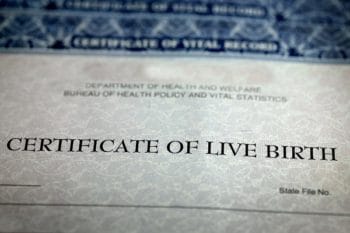If you have been adopted or are adopting a child, you will naturally be wondering about the birth certificate. Do adoption birth certificates look different?
Adoption birth certificates do not look any different than the birth certificates of those who were not adopted. There is nothing on the adoption birth certificate that will reveal that the adopted child was indeed adopted. The parents’ names on the birth certificate of someone who was adopted will show that of their adoptive parents.
There are so many questions about birth certificates when adoptive parents are going through the adoption process. Oftentimes, one question leads to another question and yet another.
We tried to include answers to several of these possible questions you may have in one article to satisfy your curiosity.

What is an Amended Birth Certificate?
The term amended refers to something that is legally changed in a small way to reflect new and updated information.
After a child’s adoption is finalized, the process of amending their original birth certificate begins.
An amended birth certificate in the adoption process is issued after the adoption is finalized.
Once a judge signs off on the adoption papers and the adoption has gone through all of the final steps, a request by the judge is put into place to obtain an amended birth certificate.
But what is being amended exactly, you may ask? The names of the birth parents will be replaced with yours, yet the vital information (birthdate, weight, time of birth, etc.) will remain the same.
The process of amending a birth certificate can take up to a year to complete. If there is a reason why you need an amended birth certificate sooner, a judge who signs off on your finalized adoption may be able to expedite the amending process.
It is important to keep in mind that after the original birth certificate is amended, the child will then have two birth certificates.
The original birth certificate does not disappear, and the child may someday want to search for his or her original birth certificate.
As FreeAdvice.com points out, if the child is being adopted internationally, the adoption papers provided to the adoptive parents in that country will then be filed in the local courts once the parents arrive back home with their child.
If the child is being adopted within the United States, the same process occurs.
The adoption certificate will be processed with the parent’s local district court based on the adoption papers they receive, regardless of where the child was adopted.
Once the certificate of adoption is finalized by the district court, it will be mailed to the local State Department of Health for processing.
At that point, an amended birth certificate will be processed and made available to the adoptive family.
The original birth certificate will be sealed and only available under certain circumstances.
The idea of the child someday finding their original birth certificate can make adoptive parents feel a bit uneasy and even somewhat insecure.
Rest assured that it is normal for an adopted child to want to research where they came from.
Just because an adopted child later tries to find their adopted parents, that does not take away from the love they feel for you! There is value in knowing who their birth parents are.
Perhaps there is a family medical history that, if known, could help your adopted child be more aware to then avoid their newly learned risks of a particular disease.
In short, I encourage you to not let your mind wander and jump too far ahead of where you are now. Be happy that your adopted child’s birth certificate is going to be amended, making the entire adoption process feel even more finalized than it already is.
Learn ways to explain adoption to your biological child.
What Does an Adoption Birth Certificate Look Like?
Parents who have or will be adopting a child might be wondering what the adoption birth certificate will look like. Rest assured, there is nothing on the adoption birth certificate that will reveal that your child is adopted.
The new birth certificate will look the same as any other birth certificate. Yet a distinguishing factor you might want to be aware of is if you live in a state where the amended birth certificate requirements show the actual place of birth.
Some states will amend the adoption birth certificate to reflect the child being born where the adoptive parents live leaving no questions to be answered down the road.
For now, you can file the amended birth certificate away and not be concerned about a possible birth location is a red flag for the child.
Or perhaps not a red flag but rather a certain topic of conversation later on down the line.
As tempting as it may be to think of a made-up reason why the birth location is so different than the residential location, I would advise not doing that. Fabricating the truth will do nothing to secure trust between you and your child.
There will be a day when your child will need a copy of his or her birth certificate. Perhaps they want to join a soccer league, and a requirement to join is to show a copy of their birth certificate.
This immediately brings to mind the question of when to tell a child they are adopted.
Honesty builds trust and respect. With that said, you are ultimately in control of what you tell your child and when or if you tell them they are adopted.
Aside from the birthplace remaining the same on the birth certificate, the child’s birth parents will have been removed with yours in their place.
There are wolves in sheep’s clothing just waiting to take advantage of hopeful prospective adoptive parents. Learn about illegal adoption and adoption fraud.
How to Tell if Your Birth Certificate is Amended?
Amended birth certificates do not look any different than any other birth certificate. Some states are required to put your true place of birth, regardless of where your adoptive parents lived at the time of your adoption.
Some states are required to put your place of birth as the same place where your adoptive parents reside, even if that is not where you were truly born.
If you are questioning your birth certificate and wondering if you were adopted, find out if the state your birth certificate says you were born in is required to put your actual place of birth or where your parents were residing at the time.
If you are questioning how to tell if your birth certificate is amended, that implies you have some deeper questions. It all varies by state.
A red flag could be, for example, if your birth certificate says you were born in one state, and yet you thought your parents always lived in another state. That could warrant some questioning.
International adoption is an option for those wanting to adopt. Become familiar with the pros and cons of international adoption so you can make an educated decision about your adoption plans.
What Happens to the Original Birth Certificate After Adoption?
As Justia.com explains, the original birth certificate in many states is sealed and no longer available.
Some states do not allow the child access to their original birth certificate even after they turn 18 years of age. Each state is different, so it all depends.
Sealing the original birth certificate and amending a new one is done so that no one will know the child was adopted just by looking at the documents.
Some states do allow the biological parents or adoptive parents to request that certain pieces of information remain the same as on the original birth certificate.
Open adoptions are more common today, where information is more easily accessible for the adoptee, the birth parents, and the adoptive parents. In the earlier days when closed adoptions were more common, many of those records were sealed.
In the older era, adoptions were closed and information kept private, as adoption was often viewed as secretive and shameful.
An adopted child from the older era of closed adoptions may request unsealing the adoption records, but this process is never easy.
If you live in a state where they provide adoption records, then you will have a much easier time with your research.
Many hope to adopt a baby, but how hard is it to adopt a baby?
How to Get My Original Birth Certificate If I Was Adopted?
To access your original birth certificate, you will need to research the adoption laws in your state.
Each state is different in the amount of information it will provide you, and each county will have its own rules on the process of obtaining the information you request.
Below will show you each state’s level of information they will provide to you.
States with Limited Access and Sealed Records
- Arizona
- Arkansas
- California
- Florida
- Georgia
- Idaho
- Indiana
- Iowa
- Kentucky
- Louisiana
- Maryland
- Michigan
- Minnesota
- Mississippi
- Missouri
- Nebraska
- Nevada
- New Mexico
- New York
- North Carolina
- North Dakota
- Pennsylvania
- South Carolina
- South Dakota
- Texas
- Utah
- Virginia
- West Virginia
- Wisconsin
- Wyoming
States with Restricted Open Adoption Records
- Delaware
- Illinois
- New Jersey
- Ohio
- Tennessee
- Washington
States with Partial Access to Records
- Connecticut
- Massachusetts
- Montana
- Oklahoma
- Vermont
States with Open Adoption Records
- Alabama
- Alaska
- Colorado
- Hawaii
- Kansas
- Maine
- New Hampshire
- Oregon
- Rhode Island
Below is an excerpt, courtesy of the Nation Conference of State Legislatures (NCSL)
State Action
Adult adoptees seeking information about their biological parents traditionally were required to obtain a court order to request an original birth certificate in most states.
A court order is still required in 25 states, the District of Columbia, American Samoa, Guam, and Puerto Rico. In recent years, however, in response to requests from adult adoptees, states have enacted laws to allow easier access to original birth certificates.
For adoptees who were adopted in open-record states, accessing your original birth certificate should not be difficult at all.
You will want to reach out to your county clerk’s office where you were adopted and request your original birth certificate, and they will guide you from there.
If you were adopted in a state with limited or sealed adoption records, the state may not disclose all adoption records unless there is a medical emergency warranting the need to do so, or if the birth parents are deceased.
Even then, some of the information may still be kept private and not provided to you.
So, what do you do if the state you were adopted in will not provide you with the information you are requesting?
You will want to file a petition in the state in which you were adopted if they will not provide you with the information you are requesting.
Remember, though, that unless you have a medical need for the information, your request will likely and unfortunately be denied.
As mentioned, however, these restrictions may be lifted if the birth parents are deceased, as there is no longer a need to protect their privacy.
If your petition was approved, you will want to send a copy of your signed approval by the judge to your birth state’s vital records department along with a written letter requesting the information.
International adoptions will be handled in the same way, yet you would send your request to the state where your adoption was finalized.

About the Author:
Trina Greenfield is passionate about providing information to those considering growing their family. Trina does not run an adoption agency. Her website is strictly information-based, so she is able to provide unbiased, credible information that she hopes will help guide those along their journey.